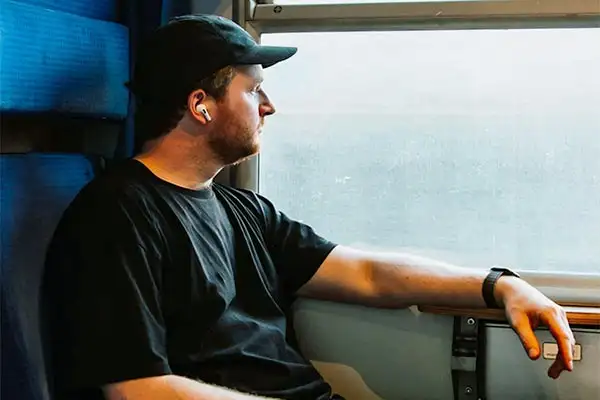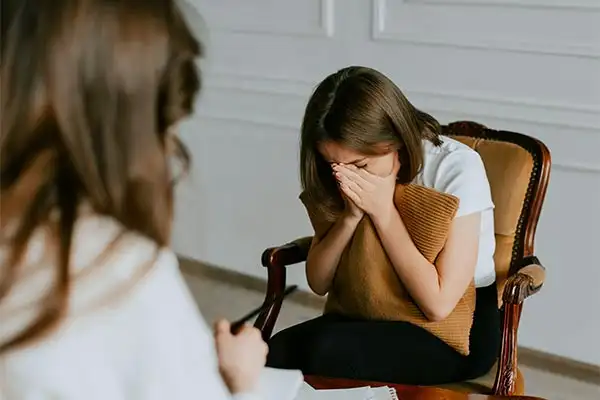Outpatient Depression Treatment
We specialize in providing long-term outpatient treatment for depression, offering personalized care and support.

Treating Depression in Los Angeles County
If you’re feeling down, lonely, out of place, and like you’re living in a fog, you’re not alone. Today, 8.8% of the adult population or 22.5 million people experience major depressive episodes with severity enough to impair their life and quality of life. Millions more experience depression as an ongoing impact on quality of life and ability to live in a happy and healthy way.
Feeling down, like something is off, or like you’re living in a fog are not normal. Instead, it’s a very treatable disorder and you can get help. Talking to your doctor and moving into a depression treatment program can help you turn your life around – with medication, with therapy, and with support and the tools you need to get your life back.
Long-Term Outpatient Depression Treatment in Southern California
At Stairway Outpatient Center we specialize in long-term outpatient depression treatment. At our LA-based mental healthcare clinic, you’ll have access to professionals specializing in depression recovery, treatment programs tailored to your needs, and a track that updates as you reach milestones, so you stay in treatment as long as you need. In short, we deliver the full support you need to recover.
What is Depression?
Depression is the term for any of a number of disorders relating to having a persistent low mood. This can be characterized by sadness, feeling down, like something is wrong, or simply lack of interest in external stimuli. In acute depression, these feelings can be temporary. However, in chronic depression, patients experience long-lasting distress that interferes with day-to-day activities, responsibilities, and relationships.
It can also manifest itself in many ways. For example, if you have persistent feelings of worthlessness and guilt, it may be depression. If you have trouble concentrating and feel like you’re in a fog all the time, it could be depression. If you feel listless and uninterested or unmotivated in things, even when you used to love them, it could be depression. You may also feel down or sad or have a cloud of melancholy hanging over you. However, the symptoms of depression can vary, and you may not even realize that you’re “sad” just that you feel off or that things aren’t right. That makes sense, because depression is about persistent low mood rather than persistent feelings of sadness.

Types of Depression
Depression can be caused by genetics, environment, personality and personal traits, sunlight, biology, and risk factors like trauma and co-occurring disorders. In addition, there are multiple kinds of depression.

Major Depressive Disorder (MDD)
This is the primary depression diagnosis and is often simply called “Depression”. It’s characterized by feelings of fatigue, low mood, lack of interest in activities, inability to find motivation, suicidal ideation, and feelings of hopelessness. You can also get a diagnosis after 2 weeks of symptoms. Treating MDD means looking into causes and finding interventions that help you turn your mental health around and then manage that recovery for the near future.

Persistent Depressive Disorder
PDD is a chronic form of depression with mild but long-lasting symptoms. PDD typically requires long-term support and maintenance to ensure you maintain quality of life around the disorder.

Postpartum Depression
Postpartum depression affects women after childbirth. This can be treated with intervention and behavioral therapy to uncover the underlying risk factors and to help the patient cope with symptoms so that they can recover.

Seasonal Affective Disorder
Many people experience depression seasonally during drops in sunlight. This can be treated with a mix of therapy as well as with light exposure therapy.
There are other types of depression as well such as situational or reactive depression, mood dysregulation disorder, and more. In each case, it’s important that you have your treatment center assess your mental health, the underlying causes, and what’s going on so you can get treatment tailored to your actual problems and get the tools you need to recover.
Signs & Symptoms of Depression
Depression can have many symptoms and many forms of expression. Many people don’t get treatment because they aren’t sad all the time. Yet, something is off. It’s important to understand that if you don’t feel good all or most of the time, it’s time to go to the doctor because chances are that something is wrong.
Depression includes symptoms like:
- Persistent sadness / low mood
- Feelings of hopelessness, worthlessness, guilt
- Anxiety
- Irritability or mood swings
- Loss of interest or motivation
- Sleeping too much or too little
- Fatigue/constant low energy levels
- Difficulty concentrating or making decisions/ brain fog
- Changes in eating habits and increases or decreases to weight
- Negative thought patterns
- Reduced performance at work or school
- Headaches
- Nausea or stomach pain
- Suicidal ideation or self-harm
Most importantly, not everyone experiences every symptom. For some people, depression feels a lot like anxiety. For others, it feels like living in a fog. The important thing is that if things are “not right”, you talk to your doctor.
Diagnosing Depression
In most cases, you can receive a diagnosis for depression after just 2 weeks of experiencing at least 5 symptoms. Here, you’ll start by talking to your primary care physician who may refer you to a specialist. It’s important to start with your doctor so they can refer you to a treatment center so that you get insurance coverage.
Questions will include:
- Your symptoms
- Your history of mental health
- The impact on your daily life
You’ll also have to rule out that symptoms of depression are not caused by physical conditions such as substance use disorder, thyroid problems, vitamin deficiencies or other medical disorders. This means you’ll typically get an examination including blood tests before receiving your diagnosis.

Our Depression Treatment Services in LA
Need Assistance?
Not sure about your coverage or have questions? Give us a call—we're here to help!
Call (888) 450 1738

Outpatient Depression Treatment
At Stairway, our focus is on delivering long-term and comprehensive treatment on an outpatient basis. This means you visit our clinic 3-5 days per week or on the weekend depending on your schedule. There, you’ll receive a fully personalized treatment program that’s tailored to your needs as you move through treatment. In addition, we base progression on milestones not on days, which means you continue to receive treatment for as long as you need it.
- Daily group therapy (typically in 90-minute sessions)
- 5-3 hours of individual behavioral therapy per week
- Complementary art therapy
- Family therapy
- Counseling
- Weekly case management
Our program means that if you live in or around LA, you can visit our clinic according to your schedule to get long-term and ongoing help with depression. We offer programs in the morning, evening, and afternoon as well as a weekend option, so treatment fits into your life.
Evaluation & Personalization
No two people are alike. Your lifestyle, your mental health, your resilience, your environment, stress levels, genetics, coping strategies, etc., are all your own. It’s critical that your treatment plan is tailored to you, so that you get treatment from where you’re at now. That means we’ll offer an initial assessment and then personalize your treatment program to your needs. That means working out which types of therapy are best fit for your situation, setting goals and milestones, setting touchpoints to reevaluate, and aligning your program with your lifestyle.
You’ll get treatment based on your symptoms, the underlying causes, risk factors, and your life – so you can learn coping mechanisms and skills to deal with depression now.

Individual & Group Therapy
We deliver evidence-based treatment incorporating behavioral therapy, counseling, group therapy, and complementary treatment into a single program. Your tailored personal plan will align treatment to your goals, so you get one-on-one support to help you work on every goal as you reach it.
Behavioral therapy including EMDR and CRM
Group therapy sessions to help you benefit from peer insights and experiences
One-on-one treatment and counseling
Group therapy is an important part of recovering from depression because it can help you realize you’re not alone, to relate to others, and to understand which of your problems really are depression. Individual therapy is important for allowing you to set goals, to share in a safe and private environment, and to work on yourself and your behaviors so you can get to where you want to be. At Stairway, we offer both, tailored to your needs at that point in treatment.
Holistic Treatment
Depression impacts every part of your life from your lifestyle to personal hygiene and self-care to eating habits, performance at work, and interpersonal relationships. It’s critical that your depression treatment tackles those impacts so that you come out of treatment healthy and with the foundations to live a happy life.
At Stairway, we offer a holistic approach to treatment. That means we deliver more than talking therapy to get you through depression. Our complementary programs incorporate creativity, wellness, and family so you get the most out of your treatment:
Family group therapy
Fitness and nutrition
Art for therapy
12-step program
Transcranial magnetic stimulation
Neurofeedback (neurotherapy)
Help with legal issues
We want you to graduate from our program with everything you need to get your life back. Whether that means building healthy habits around food and exercise, improving relationships with family, or learning to share with creativity – we’re here for you.
Insurance Coverage for Depression Treatment
Your insurance provider should cover part or all of your treatment. At Stairway, we can help you at every step. Contact us and we’ll let you know if we’re in network for your provider and what the next steps are to ensuring you get full coverage when you go to our outpatient depression treatment program.
Aftercare
No matter what your diagnosis, it’s important that you have access to ongoing aftercare and treatment options. Our aftercare planning means you’ll have touchpoints planned in to check up on progress and recovery. You’ll be able to talk to your therapists and counselors when needed. And, if your mental health starts to go badly or you’re struggling with co-occurring disorders, we can easily work you back into our program, so you get the treatment you need to stay healthy. Therapy and depression treatment should always be followed up and we make sure we’re there for you.

Get Help with Depression in LA
If you or a loved one is struggling with mental health, feeling down, or like things are not right, it’s important to talk to your doctor. From there, you can get a referral and move into a treatment program at Stairway. Depression treatment can give you the tools to overcome depression and recover. If you have chronic depression, you’ll have the toolset to mitigate depression and live your life as fully as possible around the disorder. And, with ongoing treatment, you’ll have access to care for as long as you need it.
Get in touch today to learn more about how we can help.

 Megan holds a Master’s degree in Clinical Psychology from Pepperdine University. She takes a holistic approach, building upon her client’s strengths and resources. Trained in EMDR and Ego State Therapy, she also integrates Internal Family Systems (IFS) and body-based somatic therapies into her practice to help clients regulate their nervous system and address trauma contributing to addiction issues. In addition to working at Stairways, Megan works in private practice as an AMFT, specializing in women’s health issues.
Megan holds a Master’s degree in Clinical Psychology from Pepperdine University. She takes a holistic approach, building upon her client’s strengths and resources. Trained in EMDR and Ego State Therapy, she also integrates Internal Family Systems (IFS) and body-based somatic therapies into her practice to help clients regulate their nervous system and address trauma contributing to addiction issues. In addition to working at Stairways, Megan works in private practice as an AMFT, specializing in women’s health issues. Shayne graduated with a Master’s in Counseling from Loyola Marymount University. He is trained in Cognitive Behavioral Therapy (CBT) and solution-focused techniques, with a special emphasis on supporting recovery from addiction and substance use disorders (SUD). Shayne believes that therapy should empower clients to reclaim their lives and move beyond merely surviving to thriving in recovery.
Shayne graduated with a Master’s in Counseling from Loyola Marymount University. He is trained in Cognitive Behavioral Therapy (CBT) and solution-focused techniques, with a special emphasis on supporting recovery from addiction and substance use disorders (SUD). Shayne believes that therapy should empower clients to reclaim their lives and move beyond merely surviving to thriving in recovery. Amanda graduated with a Master’s degree in Counseling Psychology with a specialization in Psychological Trauma from California Lutheran University. She is trained in psychodynamic theories with a focus on family systems and practices from a client-centered treatment approach. Amanda’s work is deeply rooted in respect, empathy, reliability, and professionalism. In addition to seeing clients in private practice, she works with individual clients and runs group therapies at Stairway Resource Center, under the supervision of Rosa Blasi-Harris, LMFT#129195.
Amanda graduated with a Master’s degree in Counseling Psychology with a specialization in Psychological Trauma from California Lutheran University. She is trained in psychodynamic theories with a focus on family systems and practices from a client-centered treatment approach. Amanda’s work is deeply rooted in respect, empathy, reliability, and professionalism. In addition to seeing clients in private practice, she works with individual clients and runs group therapies at Stairway Resource Center, under the supervision of Rosa Blasi-Harris, LMFT#129195. Michael has been an avid and successful entrepreneur since 2004, with experience in various industries including; entertainment, production, retail consumer goods, and transitional residential programs and multi-unit housing facilities.
Michael has been an avid and successful entrepreneur since 2004, with experience in various industries including; entertainment, production, retail consumer goods, and transitional residential programs and multi-unit housing facilities. As an experienced business leader and Co-Founder, Travis leveraged his leadership skills and personal family experience with addiction to inspire and create an innovative and patient-first culture at Stairway Resource Center.
As an experienced business leader and Co-Founder, Travis leveraged his leadership skills and personal family experience with addiction to inspire and create an innovative and patient-first culture at Stairway Resource Center. Jessi Brown, Senior Director of Admission and Client Experience, is more than just a member of the Stairways Resource Center team, she is an example of what this community can achieve and an example to all of our clients, especially the women.
Jessi Brown, Senior Director of Admission and Client Experience, is more than just a member of the Stairways Resource Center team, she is an example of what this community can achieve and an example to all of our clients, especially the women. Max has been working in substance abuse treatment for the past 10 years. He completed his Masters at Pacifica Graduate Institue and wrote his thesis on group therapy for addicted populations. He has run over 3000 groups and currently runs the family group at Stairways on Tuesday nights. With individual clients, he practices Habib Davanloo’s Intensve Short Term Dynamic Psychotherapy (ISTDP) and believes it to be the most powerful approach in individual counseling for those suffering with addiction, helping clients quickly resolve core issues that had often previously been ignored. He has been sober for almost 2 decades. He opens the batting for Pickwick Cricket Club.
Max has been working in substance abuse treatment for the past 10 years. He completed his Masters at Pacifica Graduate Institue and wrote his thesis on group therapy for addicted populations. He has run over 3000 groups and currently runs the family group at Stairways on Tuesday nights. With individual clients, he practices Habib Davanloo’s Intensve Short Term Dynamic Psychotherapy (ISTDP) and believes it to be the most powerful approach in individual counseling for those suffering with addiction, helping clients quickly resolve core issues that had often previously been ignored. He has been sober for almost 2 decades. He opens the batting for Pickwick Cricket Club. Tyson has worked in the treatment field since 2015 he has influenced a culture shift for individuals struggling with Substance Use Disorders and seemingly hopeless circumstances in his community.
Tyson has worked in the treatment field since 2015 he has influenced a culture shift for individuals struggling with Substance Use Disorders and seemingly hopeless circumstances in his community. Heidi has been working in the field of addiction for the past 5 years, has a RADT and moonlights as a recovery blogger. If asked, there is nothing in the recovery field that Heidi won’t do to learn more or to be of service to the newcomers.
Heidi has been working in the field of addiction for the past 5 years, has a RADT and moonlights as a recovery blogger. If asked, there is nothing in the recovery field that Heidi won’t do to learn more or to be of service to the newcomers. Kenny is a Pennsylvania native who came to southern California in 2022 for treatment of his own addiction. Following an intensive 60-day residential program he came to Stairway Resource Center to continue his own care and establish a personal recovery program. Following his outpatient therapy at Stairway he felt drawn to work in the field of addiction, recently becoming staff at the facility that both saved and changed his life. Kenny now works as the Director of Medical Services at Stairway, where he serves more than 60 clients trying to manage the same disease that nearly cost him his life. He is a devoted member of Narcotics Anonymous and committed to the men and women of the Stairway Community.
Kenny is a Pennsylvania native who came to southern California in 2022 for treatment of his own addiction. Following an intensive 60-day residential program he came to Stairway Resource Center to continue his own care and establish a personal recovery program. Following his outpatient therapy at Stairway he felt drawn to work in the field of addiction, recently becoming staff at the facility that both saved and changed his life. Kenny now works as the Director of Medical Services at Stairway, where he serves more than 60 clients trying to manage the same disease that nearly cost him his life. He is a devoted member of Narcotics Anonymous and committed to the men and women of the Stairway Community.